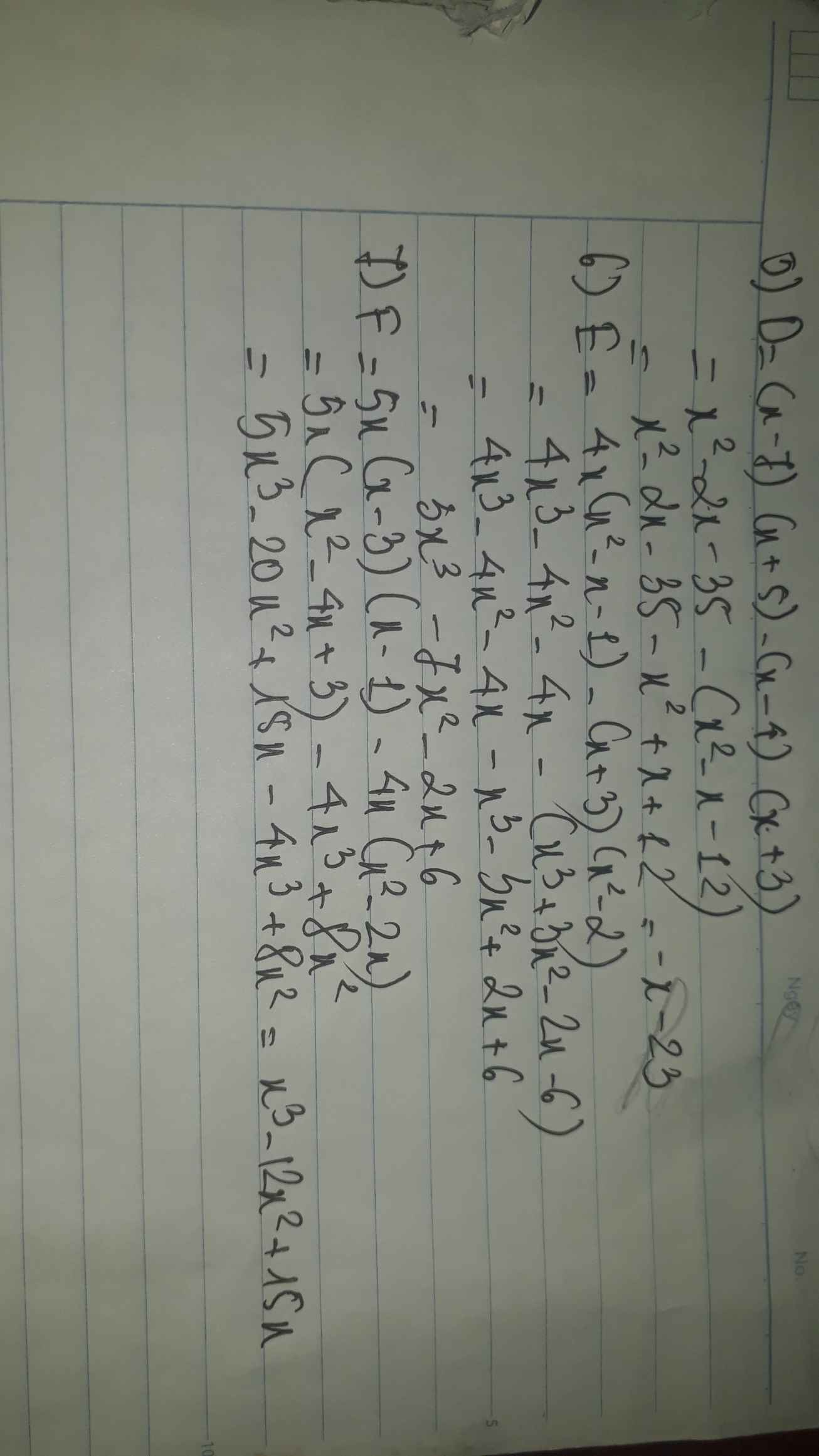Hãy nhập câu hỏi của bạn vào đây, nếu là tài khoản VIP, bạn sẽ được ưu tiên trả lời.

a) \(\left(x-2\right)^2=\left(x-4\right)\left(x+4\right)\)
\(\Leftrightarrow x^2-4x+4-x^2+16=0\)
\(\Leftrightarrow20-4x=0\)
\(\Leftrightarrow4x=20\)
\(\Leftrightarrow x=5\)
Vậy S = {5}
b) ĐKXĐ: \(x\ne0;x\ne-2\)
\(\dfrac{x+2}{x}=\dfrac{\left(x+1\right)\left(x+4\right)}{x^2+2x}+\dfrac{x}{x+2}\)
\(\Leftrightarrow\dfrac{x+2}{x}=\dfrac{x^2+4x+x+4+x^2}{x\left(x+2\right)}\)
\(\Leftrightarrow\dfrac{x+2}{x}=\dfrac{2x^2+5x+4}{x\left(x+2\right)}\)
\(\Rightarrow x\left(x+2\right)^2=x\left(2x^2+5x+4\right)\)
\(\Leftrightarrow x^3+4x^2+4x=2x^3+5x^2+4x\)
\(\Leftrightarrow x^3+x^2=0\)
\(\Leftrightarrow x^2\left(x+1\right)=0\)
\(\Leftrightarrow\left[{}\begin{matrix}x^2=0\\x+1=0\end{matrix}\right.\) \(\Leftrightarrow\left[{}\begin{matrix}x=0\left(loại\right)\\x=-1\left(TM\right)\end{matrix}\right.\)
Vậy S = {-1}
c) Câu này mình không chắc về đề lắm! Bạn dùng ô chữ M bị ngược để viết lại đề nhé!
a) Ta có: \(\left(x-2\right)^2=\left(x-4\right)\left(x+4\right)\)
\(\Leftrightarrow x^2-4x+4=x^2-16\)
\(\Leftrightarrow x^2-4x+4-x^2+16=0\)
\(\Leftrightarrow-4x+20=0\)
\(\Leftrightarrow-4x=-20\)
hay x=5
Vậy: S={5}

Bài 1:
a.
$(4x^2+4x+1)-x^2=0$
$\Leftrightarrow (2x+1)^2-x^2=0$
$\Leftrightarrow (2x+1-x)(2x+1+x)=0$
$\Leftrightarrow (x+1)(3x+1)=0$
$\Rightarrow x+1=0$ hoặc $3x+1=0$
$\Rightarrow x=-1$ hoặc $x=-\frac{1}{3}$
b.
$x^2-2x+1=4$
$\Leftrightarrow (x-1)^2=2^2$
$\Leftrightarrow (x-1)^2-2^2=0$
$\Leftrightarrow (x-1-2)(x-1+2)=0$
$\Leftrightarrow (x-3)(x+1)=0$
$\Leftrightarrow x-3=0$ hoặc $x+1=0$
$\Leftrightarrow x=3$ hoặc $x=-1$
c.
$x^2-5x+6=0$
$\Leftrightarrow (x^2-2x)-(3x-6)=0$
$\Leftrightarrow x(x-2)-3(x-2)=0$
$\Leftrightarrow (x-2)(x-3)=0$
$\Leftrightarrow x-2=0$ hoặc $x-3=0$
$\Leftrightarrow x=2$ hoặc $x=3$
2c.
ĐKXĐ: $x\neq 0$
PT $\Leftrightarrow x-\frac{6}{x}=x+\frac{3}{2}$
$\Leftrightarrow -\frac{6}{x}=\frac{3}{2}$
$\Leftrightarrow x=-4$ (tm)
2d.
ĐKXĐ: $x\neq 2$
PT $\Leftrightarrow \frac{1+3(x-2)}{x-2}=\frac{3-x}{x-2}$
$\Leftrightarrow \frac{3x-5}{x-2}=\frac{3-x}{x-2}$
$\Rightarrow 3x-5=3-x$
$\Leftrightarrow 4x=8$
$\Leftrightarrow x=2$ (không tm)
Vậy pt vô nghiệm.

1) Ta có: \(5\left(x-3\right)\left(x-7\right)-\left(5x+1\right)\left(x-2\right)=-8\)
\(\Leftrightarrow5\left(x^2-10x+21\right)-\left(5x^2-10x+x-2\right)=-8\)
\(\Leftrightarrow5x^2-50x+105-5x^2+9x+2+8=0\)
\(\Leftrightarrow-41x=-115\)
hay \(x=\dfrac{115}{41}\)
2) Ta có: \(x\left(x+1\right)\left(x+2\right)-\left(x+4\right)\left(3x-5\right)=84-5x\)
\(\Leftrightarrow x\left(x^2+3x+2\right)-\left(3x^2+7x-20\right)=84-5x\)
\(\Leftrightarrow x^3+3x^2+2x-3x^2-7x+20-84+5x=0\)
\(\Leftrightarrow x^3=64\)
hay x=4
3) Ta có: \(\left(9x^2-5\right)\left(x+3\right)-3x^2\left(3x+9\right)=\left(x-5\right)\left(x+4\right)-x\left(x-11\right)\)
\(\Leftrightarrow9x^3+27x^2-5x-15-9x^3-27x^2=x^2-x-20-x^2+11x\)
\(\Leftrightarrow-5x-15=10x-20\)
\(\Leftrightarrow-5x-10x=-20+15\)
\(\Leftrightarrow x=\dfrac{-5}{-15}=\dfrac{1}{3}\)

a: \(=\dfrac{x^2+3x+2-x^2+2x+8}{\left(x-2\right)\left(x+2\right)}=\dfrac{5x+10}{\left(x-2\right)\left(x+2\right)}=\dfrac{5}{x-2}\)
b: \(=\dfrac{x^2-4x+3-x^2-3x-2+8x}{\left(x-1\right)\left(x+1\right)}=\dfrac{x+1}{\left(x-1\right)\left(x+1\right)}=\dfrac{1}{x-1}\)
c: \(=\dfrac{x+2}{x\left(x-2\right)}+\dfrac{2}{x\left(x+2\right)}+\dfrac{3x+2}{\left(x+2\right)\left(x-2\right)}\)
\(=\dfrac{x^2+2x+2x-4+3x+2}{x\left(x-2\right)\left(x+2\right)}=\dfrac{x^2+7x-2}{x\left(x-2\right)\left(x+2\right)}\)
a,
\(\dfrac{x+1}{x-2}-\dfrac{x}{x+2}+\dfrac{8}{x^2-4}\\ =\dfrac{x^2+3x+2-x^2+2x+8}{\left(x-2\right)\left(x+2\right)}=\dfrac{5x+10}{\left(x-2\right)\left(x+2\right)}=\dfrac{5\left(x+2\right)}{\left(x-2\right)\left(x+2\right)}=\dfrac{5}{x-2}\)
b,
\(\dfrac{x-3}{x+1}-\dfrac{x+2}{x-1}+\dfrac{8x}{x^2-1}\\ =\dfrac{x^2-4x+3-x^2-3x-2+8x}{\left(x-1\right)\left(x+1\right)}=\dfrac{x+1}{\left(x-1\right)\left(x+1\right)}\\ =\dfrac{1}{x-1}\)

Bạn cần viết đề bài bằng công thức toán để được hỗ trợ tốt hơn.

1)(x2-4x+16)(x+4)-x(x+1)(x+2)+3x2=0
\(\Rightarrow\)(x3+64)-x(x2+2x+x+2)+3x2=0
\(\Rightarrow\)x3+64-x3-2x2-x2-2x+3x2=0
\(\Rightarrow\)-2x+64=0
\(\Rightarrow\)-2x=-64
\(\Rightarrow\)x=\(\dfrac{-64}{-2}\)
\(\Rightarrow x=32\)
2)(8x+2)(1-3x)+(6x-1)(4x-10)=-50
\(\Rightarrow\)8x-24x2+2-6x+24x2-60x-4x+10=50
\(\Rightarrow\)-62x+12=50
\(\Rightarrow\)-62x=50-12
\(\Rightarrow\)-62x=38
\(\Rightarrow\)x=\(-\dfrac{38}{62}=-\dfrac{19}{31}\)

1) \(\left(\dfrac{1}{2}x+3\right)\left(x^2-4x-6\right)\)
\(=\dfrac{1}{2}x^3-2x^2-3x+3x^2-12x-18\)
\(=\dfrac{1}{2}x^3+x^2-15x-18\)
2) \(\left(6x^2-9x+15\right)\left(\dfrac{2}{3}x+1\right)\)
\(=4x^3+6x^2-6x^2-9x+10x+15\)
\(=4x^3+x+15\)
3) Ta có: \(\left(3x^2-x+5\right)\left(x^3+5x-1\right)\)
\(=3x^5+15x^2-3x^2-x^4-5x^2+x+5x^3+25x-5\)
\(=3x^5-x^4+5x^3+10x^2+26x-5\)
4) Ta có: \(\left(x-1\right)\left(x+1\right)\left(x-2\right)\)
\(=\left(x^2-1\right)\left(x-2\right)\)
\(=x^3-2x^2-x+2\)

TIM VE NOI DO
?????????????????????????????????????????